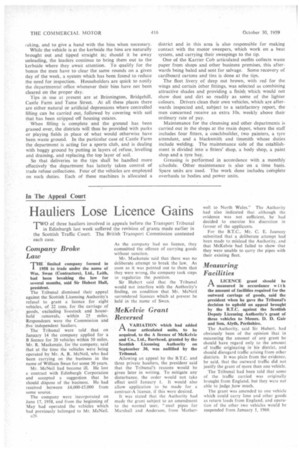In The Appeal Court
Page 60

If you've noticed an error in this article please click here to report it so we can fix it.
Hauliers Lose Licence Gains
'TWO of three hauliers involved in appeals before the Transport Tribunal I in Edinburgh last week suffered the revision of grants made earlier in the Scottish Traffic Court. The British Transport Commission contested each case.
Company Broke Law
TH16. mited company formed in h958 to trade under the name of Wm. Swan (Contractors), Ltd., Leith, had been breaking the law for several months, said Sir Hubert Hull, president.
The Tribunal dismissed their appeal against the Scottish Licensing Authority's refusal to grant a licence for eight vehicles, of 22 tons, for the carriage of goods, excluding livestock and household removals, within 25 miles. Respondents were the Commission and five independent hauliers.
The Tribunal were told that on January 14 the company applied for a B licence for 20 vehicles within 50 miles. Mr. R. Mackenzie, for the company, said that at the time the vehicles were being operated by Mr. A. R. McNeil, who had been carrying on the business in the name of William Swan for some 30 years.
Mr. McNeil had become ill. He lost a contract with Edinburgh Corporation and accepted a suggestion that he should dispose of the business. He had received between 14,00045,000 from some source.
The company were incorporated on June 17, 1958, and from the beginning of May had operated the vehicles which had previously belonged to Mr. McNeil.
1326 As the company had no licence, they committed the offence of carrying goods without sanction.
Mr. Mackenzie said that there was no deliberate attempt to break the law. As soon as it was pointed out to them that they were wrong, the company took steps to regularize the position.
Sir Hubert said that the Tribunal would not interfere with the Authority's finding, on condition that Mr. McNeil surrendered licences which at present he held in the name of Swan.
McKelvie Grant Reversed
AVARIATION which had added four articulated units, to be acquired, to the A licence of McKelvie and Co., Ltd., Barrhead, granted by the Scottish Licensing Authority on September 30, was nullified by the Tribunal.
Allowing an appeal by the B.T.C. and three private hauliers, the president said that the Tribunal's reasons would be given later in writing. To mitigate any disturbance, the order would not take effect until January I. It would also allow application to be made for a contract-A licence, if this were desired.
It was stated that the Authority had made the grant subject to an amendment to the normal user, " steel pipes for Marshall and Anderson, from Mother
well to North Wales." The Authority had also indicated that although the evidence was not sufficient, he had decided to exercise his discretion in favour of the applicants.
For the B.T.C., Mr. C. E. Jauncey submitted that a deliberate attempt had been made to mislead the Authority, and that McKelvie had failed to show that they were unable to carry the pipes with their existing fleet.
Measuring Facilities
ALICENCE grant should be measured in accordance with the amount of facilities required for the outward carriage of goods, said the president when he gave the Tribunal's decision to uphold an appeal brought by the B.T.C. against the Scottish Deputy Licensing Authority's grant of three vehicles to Messrs. D. D. Gair and Son, Myth, Perthshire.
The Authority, said Sir Hubert, had obviously been of the opinion that in measuring the amount of any grant he should have regard only to the amount of traffic originating in his district, and should disregard traffic arising from other districts. It was plain from the evidence, he said, that the outward traffic did not justify the grant of more than one vehicle.
The Tribunal had been told that some of the traffic carried was originally brought from England, but they were not able to judge how much.
The grant was amended to one vehicle which could carry lime and other goods as return loads from England, and operation of the other two vehicles would be suspended from January 1. 1960.




















































































































